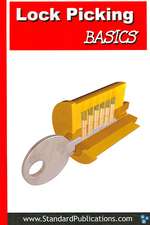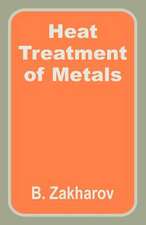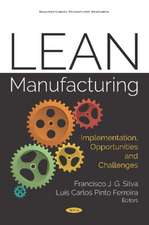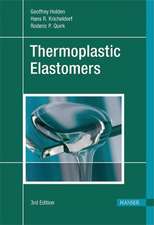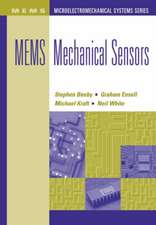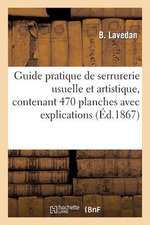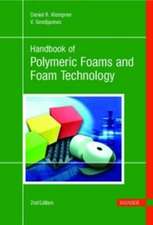Wood Adhesives
Editat de Antonio Pizzi, Kash L. Mittalen Limba Engleză Paperback – 9 dec 2019
This book is divided into four parts: Part 1: Fundamental Adhesion Aspects in Wood Bonding; Part 2: Synthetic Adhesives; Part 3: Environment-friendly adhesives; and Part 4: Wood Welding and General Paper. It addresses many different types of wood adhesives, as well as bonding (welding) of wood components without adhesives, a more recent development. The information contained in this book is valuable for individuals engaged in all aspects of wood adhesion and adhesives and, hopefully, will inspire new ideas in wood adhesives, a topic of vital industrial importance.
Preț: 461.03 lei
Preț vechi: 542.39 lei
-15% Nou
Puncte Express: 692
Preț estimativ în valută:
88.22€ • 92.35$ • 72.99£
88.22€ • 92.35$ • 72.99£
Carte tipărită la comandă
Livrare economică 07-21 aprilie
Preluare comenzi: 021 569.72.76
Specificații
ISBN-13: 9780367445966
ISBN-10: 0367445964
Pagini: 462
Dimensiuni: 170 x 245 x 24 mm
Greutate: 0.45 kg
Ediția:1
Editura: CRC Press
Colecția CRC Press
ISBN-10: 0367445964
Pagini: 462
Dimensiuni: 170 x 245 x 24 mm
Greutate: 0.45 kg
Ediția:1
Editura: CRC Press
Colecția CRC Press
Public țintă
Professional Practice & DevelopmentCuprins
Part 1. Fundamental Adhesion Aspects in Wood Bonding. Natural Lignans as Adhesives for Cellulose. Evaluation of Some Synthetic Oligolignols as Adhesives. Modification of Sugar Maple (Acer saccharum) and Black Spruce (Picea mariana) Wood Surfaces in a Dielectric Barrier Discharge (DBD) at Atmospheric Pressure. Determination of the Microstructure of an Adhesive-Bonded Medium Density Fiberboard (MDF) using 3-D Sub-micrometer Computer Tomography. Influence of the Degree of Condensation on the Radial Penetration of Urea-Formaldehyde Adhesives into Silver Fir (Abies alba, Mill) Wood Tissue. Radial Penetration of Urea-Formaldehyde Adhesive Resins into Beech (Fagus Moesiaca). A Flexible Adhesive Layer to Strengthen Glulam Beams. Properties Enhancement of Oil Palm Plywood through Veneer Pretreatment with Low Molecular Weight Phenol-Formaldehyde Resin. . Reaction Mechanism of Hydroxymethylated Resorcinol Adhesion Promoter in Polyurethane Adhesives for Wood Bonding. Part 2. Synthetic Adhesives. . Optimization of the Synthesis of Urea-Formaldehyde Resins using Response Surface Methodology. Characterization of Urea-Formaldehyde Resins by GPC/SEC and HPLC Techniques. Formaldehyde-Free Dimethoxyethanal-Derived Resins for Wood-Based Panels. Melamine–Formaldehyde Resins without Urea for Wood Panels. Bonding of Heat-Treated Spruce with Phenol-Formaldehyde Adhesive. Influence of Nanoclay on Phenol-Formaldehyde and Phenol-Urea-Formaldehyde Resins for Wood Adhesives. Emulsion Polymer Isocyanates as Wood Adhesive. Adhesives for On-Site Rehabilitation of Timber Structures. Part 3. Environment-Friendly Adhesives. Thermal Characterization of Kraft Lignin Phenol-Formaldehyde Resin for Paper Impregnation. Acacia mangium Tannin as Formaldehyde Scavenger for Low Molecular Weight Phenol-Formaldehyde Resin in Bonding Tropical Plywood. Synthesis of Modified Poly(vinyl acetate) Adhesives. Acrylated Epoxidized Soy Oil as an Alternative to Urea-Formaldehyde in Making
Notă biografică
Pizzi, Antonio; Mittal, Kash L.
Descriere
Wood adhesives are of tremendous industrial importance, as more than two-thirds of wood products in the world today are completely or partially bonded together using a variety of adhesives. This book is divided into four parts: Part 1: Fundamental Adhesion Aspects in Wood Bonding; Part 2: Synthetic Adhesives; Part 3: Environment-friendly adhesiv



